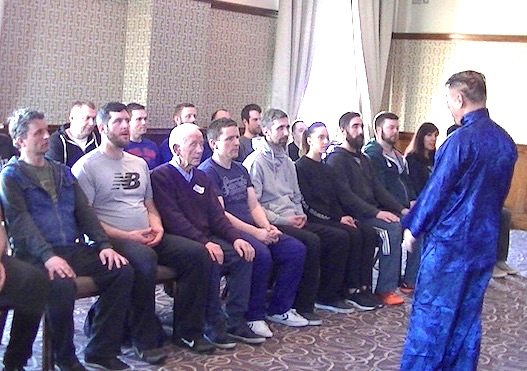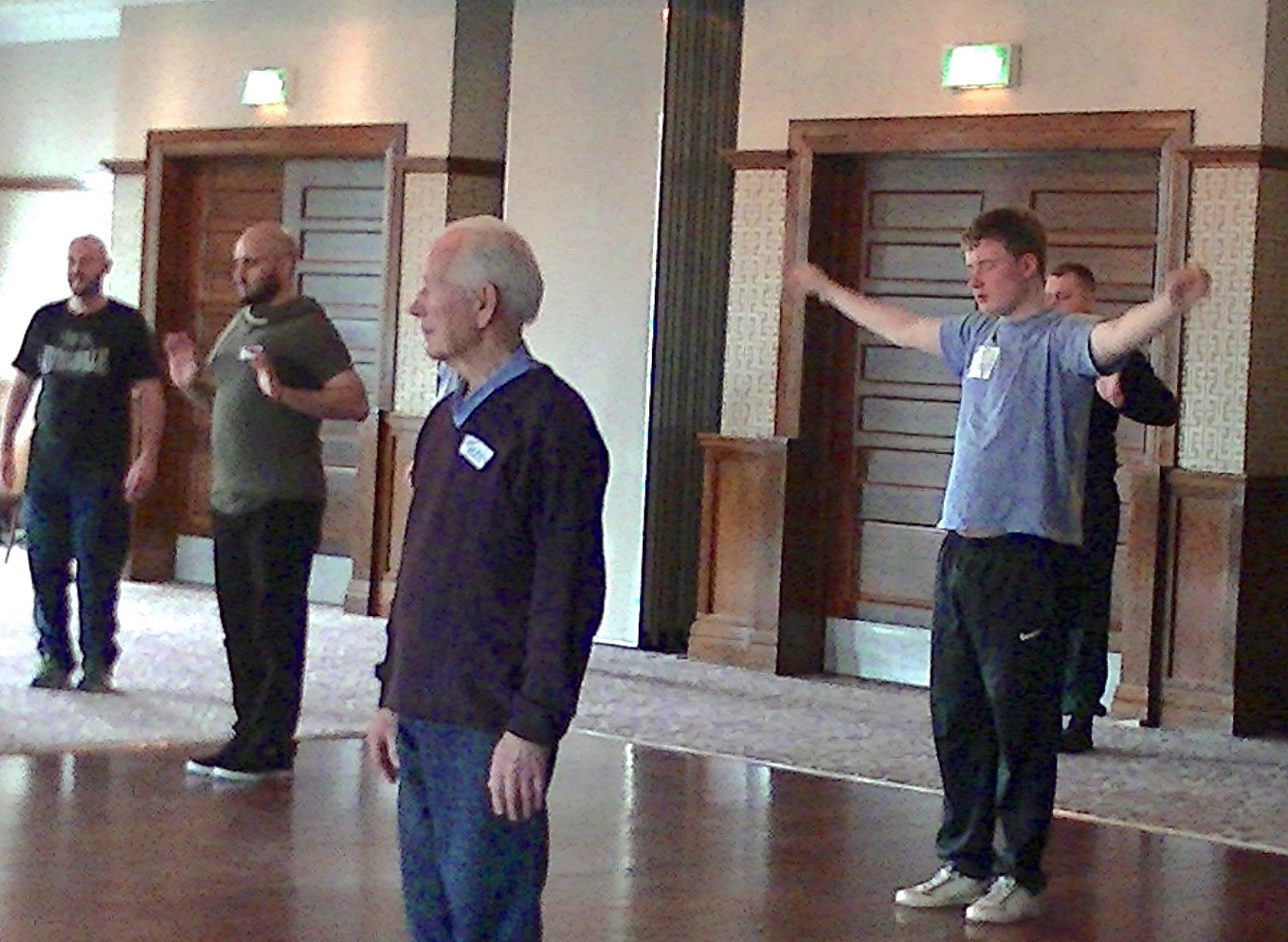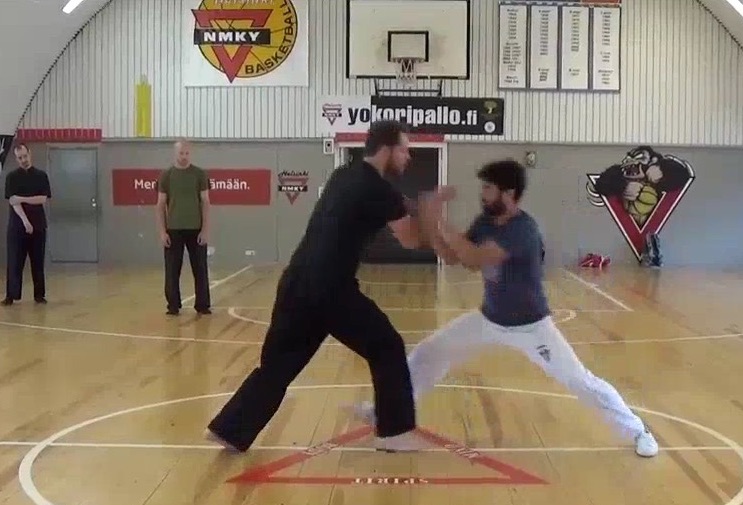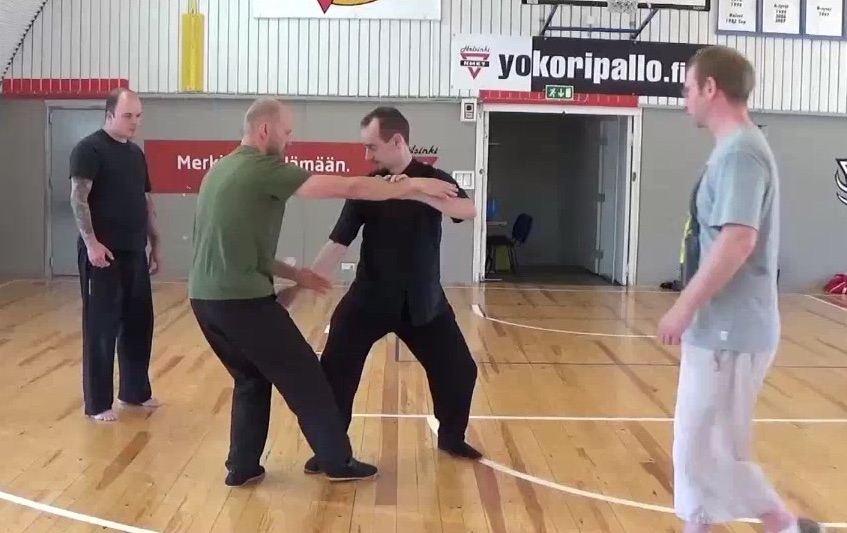SELECTION OF QUESTIONS AND ANSWERS
AUGUST 2018 PART 1

Grandmaster Wong explaining some important points to a chi kung class in Ireland
Question 1
How often do I practice chi kung and for how long?
— Anitia, Spain
Answer
You need to practice only once a day for about 10 minutes. If you enjoy your practice, as most students in our school do, or you think that 10 minutes is not enough, you can practice for another session of 10 minutes, but the two sessions must be far apart so that there is sufficient time for your body to adjust to the tremendous energy you have generated in your practice. If your two sessions are too close, you may over-train.
If you practice for 2 sessions a day, about 10 minutes a session, an excellent suggestion is once in the morning, and the other time in the evening or at night. It is beneficial to practice at about the same time for each session. For example, if you practice at 8.00 in the morning, try to keep your practice at 8.00 every morning. Don't practice at 8,00 on one day, 10.00 on another, and 4.00 on the third.
10 minutes a session and two sessions a day is meant for our school. Most other chi kung practitioners practice for about an hour per session. For us, 10 minutes is enough, as our chi kung is very powerful. If you practice longer, it may lead to over-training.
What do you do for the remaining 50 minutes? You can hug your husband, play with your children, talk to your friends, or do any wholesome things. Your practice of 10 minutes a session, 2 sessions a day will give you a lot of energy, mental freshness and efficiency. You will find that you have more time to live life fully everyday.
If you miss a session on one day, you also practice for about 10 minutes the next day. You need not practice for extra time. Also, irrespective of the number of exercises you practice per session, the total time of practice is also about 10 minutes.
In other words, if you practice only one chi kung exercise, your practice is 10 minutes. If you practice 3 chi kung exercises in the same session, your total time of practice is also 10 minutes, not 30 minutes. If you have more than one exercise per session,you have to adjust the number of repetition per exercise or adjust the speed. Generally, it is more beneficial to practice one exercise per session. Sometimes, you may practice more exercises for fun, or for variation.
Question 2
Why is that I have practiced chi kung daily for many months from one of your certified instructors, but I do not feel an increase of energy?
— Lin, Italy
Answer
Here are the reasons why a student does not have chi kung results although he has learned from a qualified instructor:
- He does not practice. This reason does not apply to you as you have practiced daily for many months.
- He practices wrongly. This reason also does not apply to you as you have learned from a certified instructor.
- He over-trains. This reason also does not apply to you as you do not show any symptoms of over-training.
- The benefits he has obtained form his practice have overcome problems that he may not realize or may not even know. This reason may apply to you. For example, previously you could study for half an hour, and then had a rest. But now you can study continuously without resting after half an hour, but you may not realize it. They might be some problems with your liver, and your chi kung practice has overcome the problems without your knowing.
- He worries excessively. This reason may apply to you as you are concerned with an increase of energy, without realizing or knowing that your chi kung practice actually has benefited you.
- He intellectualizes excessively. This reason may apply to you. You intellectualize why you have not experienced an increase of energy. Remember that the first two golden rules of our practice are not to worry and not to intellectualize. The third golden rule is to enjoy your practice.

Chi kung may have helped to overcome some serious problems that practitioners may not know
Question 3
I see in your webpages and forum that your students are open and happy. Can practicing qigong make us happy?
— Leon, Germany
Answer
Yes, practicing genuine qigong, which is also spelt as "chi kung", can make us happy. It can also make us open. Being open and happy is one of the wonderful benefits of qigong, besides giving us good health, vitality and longevity.
Why does practicing qigong make us happy?
When we practice qigong, we generate an energy flow. The energy flow clears blockage, thus overcoming illness, and opens organs, making them healthy and resilient. When the energy flow opens the heart, we become happy. Indeed, in Chinese "open heart" means being happy.
In our school, Shaolin Wahnam, we do more. Every time we practice, we smile from the heart. Smiling from the heart opens the heart.
When a person is sick, he is unlikely to be happy, though in some rare cases sick persons can still be happy. Practicing qigong does these two things -- making him healthy and making him happy.
Question 4
You mentioned that martial artists today did not achieve the objectives of why they practiced a martial art. Why did you say so?
— Vicente, Spain
Answer
Yes, most martial artists today do not achieve the aims of their practice though they may be dedicated. The two main reasons to practice a martial art, any martial art, are to be able to defend oneself and to be healthy.
Most martial artists today cannot defend themselves. This may be a surprise to other people, but it is a fact. When martial artists engage in sparring, they punch and kick one another. Often, their injuries, which they sustain regularly, are left unattended to.
If martial artists can defend themselves, they will not be hit. Indeed, being hit happens so regularly that some instructors tell their students that they must be able to take hits as they practice a martial art. This is ridiculous. A main reason to practice any martial art is not to be hit at all. It is more ridiculous when they practice a martial art as a hobby, not as a need.
Being hit regularly and the injuries routinely left unattended to, is detrimental to health. Even if they do not engage in sparring, the ways students train their martial art, like grimacing their faces and tensing their muscles, are unhealthy. It is, therefore, no surprise that martial artists are stressful and injured. Many martial artists have to be hospitalized due to their injuries.
In my younger days about 50 years ago, a kungfu master was well respected. He was known to be righteous and courageous. This form of respect, unfortunately, is not accorded to masters today. They are often regarded as bellicose.

A practitioner must be able to defend himself when practicing a martial art
Question 5
I read your article a few weeks ago about a person who practiced Iron Palm for 2 years and did not use "tit da jow" I got back into Iron Palm and added Iron Body.
There is a Shaolin instructor near me saying that it is not healthy if a practitioner does not use "jow" at all in Iron Palm and Iron Body. What does he exactly mean?
— Michael, USA
Answer
The Shaolin instructor means that if a practitioner does not use "tit da jow", or Chinese medicated wine, when training Iron Palm or Iron Body, which we in Shaolin Wahnam call Iron Shirt, it is injurious to his health.
If the practitioner practices genuine chi kung, he may not use Chinese medicated wine. Genuine chi kung, which generates chi flow, is more effective.
When a practitioner hits his palm on a sand bag (or a bean bag or a bag of pebbles), not only he deforms his hands and loses their normal functions, more insidiously, he also distorts the energy flow in his meridians which injures his internal organs.
The harm caused by Iron Shirt training is worse. Without the use of Chinese medicated wine and other proper methods, the constant hitting of his body with bags, sticks or iron rods, causes more injury to his energy flow and internal organs. Although he may not be clinically sick, his health, vitality and longevity will be affected, usually without his knowing.
Question 6
Is it still advisable to train Shaolin with him?
Answer
Whether it is advisable to train Shaolin arts with him or any other instructor, depends on a few other factors. Three important factors are whether the instructor is honorable, whether he can help you to obtain the aims of kungfu training, and whether he can provide remedial exercise or other help if things go wrong.
It is commonly known in kungfu that the use of Chinese medicated wine is an essential condition in hard external training, like in Iron Palm and Iron Shirt. The instructor you mentioned might not have said it explicitly, but be probably understands the important principle that before one trains kungfu for combat, he must be healthy, or in Chinese (Cantonese), "mei fong san, xin keong san".
Obviously, and implicitly, many martial art instructors do not cherish this principle. Their students harm themselves in the training itself.

A kungfu practitioner must be healthy first before talking of combat
Question 7
Muay Thai practitioners bang their shins, and Karate practitioners strike boards with ropes wrapped around them. Some strike a pad against a wall. They do not use "jow". They end up with callouses. I am sure that is not healthy. How can I train safely?
Answer
Not only their training does not contribute to their good health, it actually makes their health worse. In other words, in good kungfu training, the practitioners' health become better as a result of their training. In bad kungfu training and in most other martial art training, the practitioners' health become worse as a result of their training.
Other martial artists may be angry at my statement, but I am just stating a fact, or at least my opinion. Honestly, I do not know of any other martial arts, except Jujitsu and Aikido, that contribute to health. Perhaps this is due to their history and philosophy.
Muay Thai fighters fight in rings to feed their fathers' families. Karate fighters fought against Samurais on horseback. Taekwondo fighters fought against Japanese invaders. Boxing and Wrestling are for entertainment, and professional Boxers and Wrestlers earn a lot of money. The father of Judo took away dangerous martial art techniques to make it a sport, but he probably forgot that the constant felling of Judokas was bad for their health.
On the other hand, an important principle of kungfu training is that before practitioners trains combat, they must be healthy. It also implies that in their training, practitioners should not sacrifice their health for other objectives. This is a good starting point, but it does not necessarily mean that their training will contribute to their health.
This is where good kungfu training comes in. Good kungfu focuses not just on the physical body, but also on energy and mind. The training of energy and mind contributes to health, vitality and longevity. In fact, all kungfu is triple cultivation, which is cultivation of the physical, energy and mind, Bad kungfu instructors may not realize this fact that good kungfu focuses on cultivation of energy and mind besides the physical body.
Question 8
I do chi kong before Iron Palm and Iron Body training. I also do proper breathing. I tap a bag lightly for strikes in Iron Palm sets. It is the same with Iron Body. I tap myself lightly not to harm myself. I monitor myself to be safe. So, if I do not use "jow" for Iron Palm and Iron Body, how can I keep my training safe? I am 49 years old.
Editorial Note: Micahel's other questions can be found in August 2018 Part 2 of the Question-Answer Series.
Answer
I do not refer to your practice, but when people say that they practice chi kung, most of them only practice chi kung forms or techniques, just as when people say that they practice Taiji, most of them only practice Taijiquan forms or techniques. Most chi kung practitioners today do not practice chi kung, which is an art of energy, just as most Taiji practitioners today do not practice Taijiquan, which is an internal martial art.
Only when a practitioner practices genuine chi kung, he will not be injured in Iron Palm or Iron Shirt training even when he does not use Chinese medicated wine. The hallmark of genuine chi kung is chi flow, or energy flow. The chi flow will clear whatever harm Iron Palm or Iron Shirt training may accidentally cause.
Proper breathing and tapping lightly on a bag do not have this result. Unless you practice genuine chi kung, an effective way to keep Iron Palm and Iron Shirt training safe is to use "thit da jow", or Chinese medicated wine.
49 is a relative young age for kungfu practitioners. Most kungfu masters are past 45. Before 45, they are regarded as too young to be called masters.
LINKS
Selected Reading
- History of Chi Flow in Shaolin Wahnam
- Shaolin Kungfu Now and 500 Years Ago
- Taiji Dance and Genuine Taijiquan
- Flowing Water Floating Clouds
- Guinness Attractions
